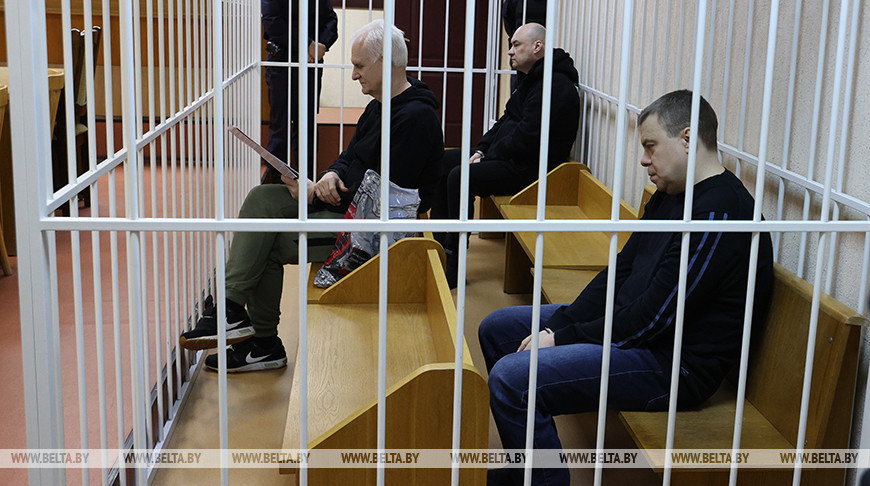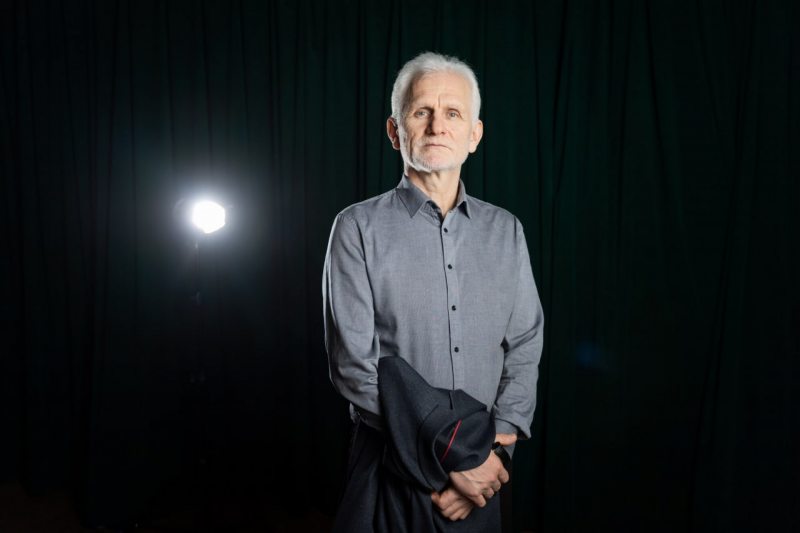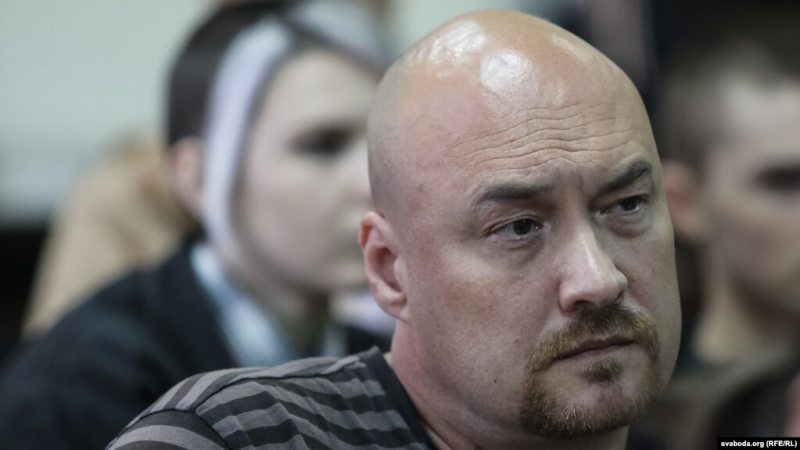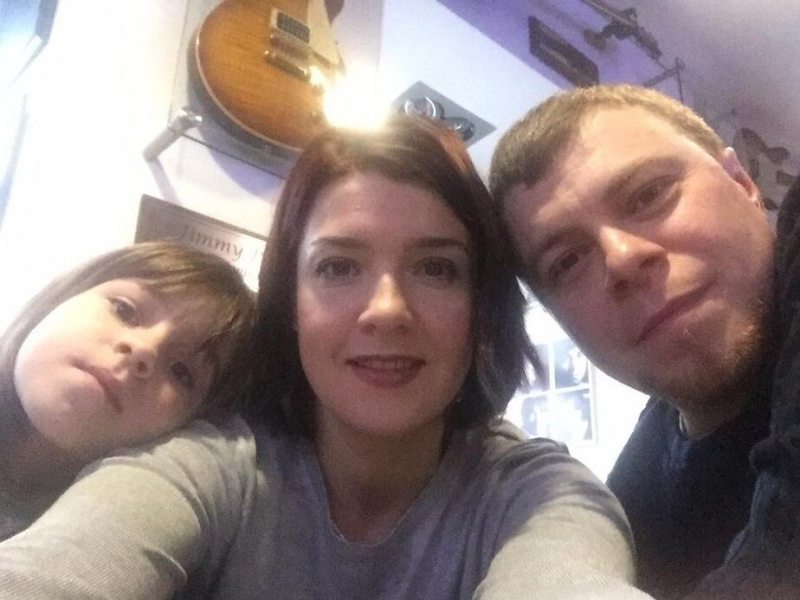What Bialiatski, Stefanovic, and Labkovich said in their last word in court: full translation of their speeches
The Lieninski District Court of Minsk has finished the hearings in the criminal trial against the Viasna chair and Nobel Peace Prize laureate Ales Bialiatski, his deputy and FIDH vice-president Valiantsin Stefanovic, Human Rights Defenders for Free Elections campaign coordinator Uladzimir Labkovich, and human rights defender Zmitser Salauyou who is tried in absentia. On February 13, human rights defenders gave their last words the full translation of which from Belarusian into English we publish today.
Ales Bialiatski: “Enough is enough, we must stop this civil war”
“The criminal case against us, human rights defenders of Viasna, is politically motivated. This whole saga of 284 volumes, hundreds of searches, and interrogations all over the country have nothing to do with the [real] preliminary investigation, plus political background.
And after that, there was no fair trial either. The investigation into the so-called criminal case lasted a year and a half. Of the four lawyers who defended me at various stages, one—Vital Brahinets—ended up in jail and was sentenced to eight years, two more were disbarred in recent months, and only one made it to the finish line. This unprecedented pressure on lawyers reveals the difficult and dangerous conditions under which they have to defend their clients.
Once we reviewed some volumes of the so-called criminal file, it became clear that the investigation pursued the goal that was set for them: to jail human rights defenders of Viasna at any cost, to destroy Viasna, and to stop our work. Only this can explain the sudden change of charges from ‘tax evasion’, which had lasted 13 months from the date of our arrest, to ‘smuggling by an organized criminal group’, [the latter] meaning Viasna. The authorities are obviously violating the international obligations they have undertaken to protect human rights defenders within the framework of the UN and OSCE Joint Agreements.
We should also note that during the investigation state media—various TV channels and the Belarus Today newspaper, funded by the Presidential Administration—presented their extremely negative value judgment of the Viasna human rights defenders. Thus, as early as last September, they claimed that human rights defenders had been distributing extremist materials and financing protests.
A separate set of all kinds of fake information, rumors, and lies was released in the last week and yesterday [February 12]. All this was actively broadcasted on state TV channels which accused us of various sins, which even the investigation and the prosecutor's office had not thought of. I see this as a violation of the presumption of innocence, and direct pressure on the court. We have not yet been convicted, but the state media are already calling us criminals.
The linguistic situation in court was extraordinary. The prosecution and the court categorically refused to speak Belarusian, despite the fact that I, as a defendant, am a Belarusian-speaking person. I speak, write, and think in Belarusian. I remind you that the Belarusian language is the state language, and you, as state officials, must speak the two state languages, including Belarusian, not mumble-jumble. Therefore, you are obliged to speak Belarusian to Belarusian-speaking citizens. For example, the Law ‘On citizens' appeals’ provides that if one writes in Belarusian, then any deskbound official answers you in Belarusian. Thus, they put me in an unequal position with the prosecution. I was not given the opportunity to explain my position thoroughly and in detail, to challenge the unfair and senseless accusation.
The prosecution and the court practically refused to hear me, to ask me the questions they were interested in during the trial and my hearing. It seems that neither the prosecutor's office nor the court was interested in the truth at all—for them everything was clear from the very beginning, even before the trial. I would like to remind you that neither the prosecutor's office nor the court gave me the opportunity to review all 284 volumes of the so-called criminal file.
The political underpinning of criminal proceedings against Viasna human rights defenders is also evidenced by the overall situation in the country, permeated with mass repression and total human rights violations during and after the election campaign in 2020. Instead of hearing the voice of the people, a violent reaction took place in Belarus. A clearly political decision of the authorities was to crush the civil society in Belarus and destroy it. Independent journalists and bloggers, analysts and political scientists, independent trade union activists, political parties and movements' leaders and activists, presidential election teams members and the candidates themselves, national culture figures, writers, musicians, artists, teachers and students, athletes, ordinary protesters, and just random people were exposed to the machinery of repression. There are now 1,500 political prisoners in the country. Hundreds had already been through jail in the last two and a half years and were released after their punishment was over. Tens of thousands of peaceful activists were arrested and sentenced in administrative proceedings. It is not surprising that in this time, when human rights in Belarus went down the tubes, human rights defenders are also among those jailed. These include the coordinator of the Viasna Volunteer Service Marfa Rabkova, volunteer Andrei Chapiuk, Homieĺ human rights defender Leanid Sudalenka, volunteer Tatsiana Lasitsa, and other volunteers who helped the victims of mass repression.
Repression in the country continues today. This is indicated by more and more new political prisoners, who appear in pre-trial detention facilities. For example, human rights defender Nasta Loika was recently arrested. There is a series of trials in politically motivated criminal cases. This level of repression, of all sorts of pressure on society by the authorities, is unbelievable, unimaginable, and unprecedented! It was only in the dark years of the Russian Empire and under Stalin's rule until his death in 1953 that something like this was happening in our history. At the beginning of the 1980s, at the height of the Soviet Union's crackdown on dissidents, human rights activists, activists of national and religious movements, there were about three thousand political prisoners in the entire Soviet empire with its vast population of 250 million people. Now there are 1,500 political prisoners in Belarus alone
I am convinced that the government's current policy of total control of society and the brutal suppression of dissent, the total rejection of pluralism of thought, and reorganizing the state into a totalitarian society modeled after the Soviet Union of the 1970s is totally unpromising. The world is moving forward into a post-industrial era. A new generation and millions of Belarusians, who have civilizational values different from those of the Soviet epoch, have already grown up. They do not want to live in Soviet barracks. They won’t be content with just a crust of bread sprinkled with water and sugar or fried lard. They want and demand that their voice be heard, considered, and counted. They want to live in an economically developed, democratic, and independent Belarus.
The events of 2020, the mass protests against the manipulation of election results, against human rights violations, clearly showed that better than any opinion poll. For many people, these events were a surprise, and for the authorities, it was an unpleasant surprise. We must admit that society and people in the country are strongly divided biologically, value-wise, and mentally, but those who live in society can see that this division is based on age, place of residence, and level of education, although there is nothing surprising and unique in this. Societies are heterogeneous all over the world. They include different people of different views, their interests are represented by political parties, and truly fair elections make it possible to treat the authorities with more or less certain trust. The division of Belarusian society is not fatal. Both society and the state can live with it, but one should be clearly aware of its existence, instead of turning a blind eye and building a cozy world for oneself the way some would like to.
Millions of Belarusians think, reason, and—after all—live one way, and millions of others do it another way. And today it doesn't matter who outnumbers whom. There are millions on both sides. It is important to understand that this social division will be with us for a long time. All of us—the entire Belarusian society, no matter what our views and convictions—will have to live with this division for a long time. The path of confrontation, where one side—the security services, the prosecutor's office, the investigators, the courts—pushes forward and suppresses the other side, is dangerous and unpromising. It leads nowhere. The history of Latin America in the 20th century—Chile, Argentina, Haiti, and others—confirms this. Banana Republic juntas, dictatorships have no prospects for any lasting life and development. The result of this policy of intolerance, confrontation, and total rejection of political pluralism is a constant socio-political, social, and economic crisis, and mass migration. All of this is tightly knotted together.
The situation of a full-scale crisis in the state puts the sovereignty of Belarus in jeopardy. We face huge geopolitical challenges, and the country has come to a dead end. As our ancestors said: “From this trap net, there is no going back, no going forward”. The only possible way out of the all-around crisis in which Belarus is caught up appears to be a constant long-term search for a consensus, a balance in society, taking into account the interests of different strata of society. In order to preserve Belarus as a state, for the sake of the future of our people, all of us, and first of all the authorities, must show wisdom and foresight. I recall an appeal we, the Human Rights Center Viasna, made on the eve of the 2020 election and which was published on our website and in other media outlets. We urged the authorities not to use violence against peaceful demonstrators. They used, and what did it end with?
It is necessary to start a broad public dialogue aimed at national reconciliation, no matter how hard it may seem to go. It must be preceded by the release of all political prisoners, a broad amnesty—and an end to repression, as there is no point in an amnesty if people are released with one hand and put in jail with the other. Both the authorities and representatives of the general public, political parties and movements, those who are now in prison, and those who are fleeing the repression and have been forced to go abroad should take part in such a dialogue. It is a feasible proposal, as long as there is a desire and political will to do so. The socio-political crisis in Belarus is not unique. Right now, other countries in various corners of the world struggle to overcome similar crises: Kazakhstan, Venezuela, and even Iran.
We have to clearly realize that it is better to hold tough negotiations and gradually get out of the crisis than to fall into a reckless confrontation, which can lead to very serious consequences: poverty and misery, violence and injustice—which will ruin Belarus. If we think of Belarus as our common homeland, where there is room for everyone, regardless of different political views and geopolitical preferences; if we do not want to plunge the country into poverty; if we do not want mass migration out of Belarus in search of a better life; if we want to get a chance for economic, social, political, ecological development of our people—we must start this national dialogue! Enough is enough, we must stop this civil war. I hope that my words will be heard.”
Valiantsin Stefanovic: “We have not lived our lives in vain, we have prepared our successors”
“On Thursday, I spent half of the day listening to the prosecuting attorney and couldn’t hear any reasoning. Only general evidence and the phantasies of court investigation was received from the accusation. Again, there is no established evidence of me or my colleagues committing a crime. I will not be repeating the arguments of defence attorneys, I will only highlight that from the very moment of my arrest I take a stand of not admitting any guilt. I remind you that the case was initiated according to part 2 of Article 243 of the Criminal Code, ‘tax evasion in especially large amounts’. In fact, I was being accused according to this article for more than a year. Back in December of year 2021, an inspection by Ministry of Taxes and Duties of Partyzanski district of Minsk was started, and terminated sometime in August of year 2022, resulting in no reasons not even for an administrative case, not to mention criminal case. For 13 years there was no surplus of the budget, outflows minus inflows, established. I remind you that in 2008 a tax inspection was held, and it didn’t find any violation of the law or outflows exceeding inflows. So in fact, since 2008 I am constantly being checked by tax inspection, that do not reveal any law violations.
After all, the criminal case under Article 243 of the Criminal Code after more than a year of my detention was terminated, and charges were brought under part 4 of Article 228 and Article 342 of the Criminal Code. I also did not plead guilty to the new charges. After getting acquainted with the materials of the case during the preliminary investigation, I wrote a petition for the termination of the criminal prosecution against me and my immediate release from custody. Of course, I was denied the satisfaction of my petition. In his response, the investigator Kalyaga indicated that, in his opinion, I am an accomplice in the commission of a crime according to the general composition of the incriminating charge. So according to the investigation, I would be a part-taker in the form of an accomplice, if it was not an organized group, and qualified under art. 16 of the Criminal Code. But since we are being indicted by an ’organized group’, it means that all accomplices are co-executors regardless of their role. But I repeat that there is no evidence of an existing organized group.
As for Part 2 of Article 342 of the Criminal Code, here the accusation was clearly copied from the Declaration on Human Rights Defenders. So, we are accused of carrying out legitimate human rights activities. But even on these charges, the investigation did not provide any evidence of my involvement in the commission of this crime.
I would like to point out that [this trial] has been conducted from the very beginning in violation of our rights, with the use of treatment that degrades human dignity, in violation of the presumption of innocence, and in violation of equality of rights. Thus, the accused human rights defenders were deprived of the opportunity to interrogate the majority of the declared witnesses in the case, including the so-called ‘phony witnesses’, whose testimony the prosecutor proposes to base the verdict on, which is not surprising. Considering the fact that one of them is none other than an unsuccessful agent of the special services in the human rights community. This is a well-known fact. Well, and now the agent of the special service of "Soviet Belarus" Alyona Krasovskaya who was constantly present in the courtroom during the trial, despite the fact that she was a witness and actively commented on the situation even before the trial. She actually stated her testimony in one of the issues of "Soviet Belarus" before the start of the trial. Naturally, I believe that such testimony is not permissible and cannot form the basis of a verdict. And in fact, you can't call it testimony, it's just a collection of some a-little-bird-told-me gossip and rumors.
Well, the main thing I would like to note is the coverage of the trial in the media before adjudgment. They called us all kinds of people there: scammers, swindlers. They also said that we had financed a coup d'etat and mass riots and many, many other things. The presumption of innocence is a constitutional guarantee, it belongs to all the accused, in spite of the type of the accusations. Back to what the prosecutor said during the speech, ‘everyone is equal before the law’. We are also equal before the law and have the same rights as all other citizens, including the presumption of innocence.
Of course, I have no illusions about this verdict and do not hope for a fair trial in conditions when the whole country is actually returning to our "bright" past — to communist totalitarianism. Here of course I cannot tell how much the judicial system is not independent in such situations and after August 2020 it is simply in a degraded position. The so-called supervisory bodies of legality now live by the principle ‘sometimes not up to the laws’.
Let me remind you that torture is one of two absolute human rights. So they [restrictions in these rights] are unacceptable under any circumstances: neither under martial law, nor in war, nor in any other cataclysms. And of course, to protect people from torture and arbitrariness you need to have professional dignity and courage. But nevertheless, I saw people in the pre-trial detention center who remained faithful to their oath and professional level, such as the assistant prosecutor of the Pervomaisky district of Minsk, Captain of Justice Yevgeny Babak with whom I was in a temporary detention center and later for more than six months in the same cell of the investigative isolator, and other representatives of the prosecutor's office and the Investigative Committee.
Meanwhile, the torture continues. People who get into the pre—trial detention center talk about what is happening in Akrescina [detention facilities[, how passwords are taken from people by force, how they are beaten with stun guns, how 30 individuals are pushed into double cells, and how people are forced to sleep on the floor without mattresses, without warm clothes. All this lasts. And there is no one to protect these people.
The crisis inside the country, which began in August 2020, continues. But as we can see, there is no full-fledged dialogue and it is not expected. All this reminds us, as I have already said, of our totalitarian past - since the Congress of the CPSU with people who were not elected honestly... In short, as one hero of the Pokrovsky Gate film said, ‘Live and rejoice and do what you are told to’.
As for Viasna, there have always been threats against us, and for some reason, they coincided with the election campaigns. In our country we have such rationality: those who participated in the elections go to jail. And now it has expanded to include representatives of the independent media and civil society. [So far] no one has been prosecuted for activities on behalf of an unregistered organization. Why is that? Because our law enforcement agencies only bite when there is an order. If there is no command, no one bites. So it was in 2001, 2006, 2010 and 2020. "Viasna'' was liquidated two years after the 2001 presidential election. In 2006, there was a situation similar to this when those who act without registration were announced on television as enemies of the Republic of Belarus. Then time passed, political instructions changed, and already in 2009 I participated in a delegation of human rights defenders which met with the first deputy head of the presidential administration Natalia Petkevich.
I declare once again that my persecution is solely related to my human rights activities — legitimate and peaceful. Our persecution is entirely political. But it will never stop Viasna from working. We have not lived our lives in vain, we have prepared our successors. New generations of Belarusian human rights defenders have grown up and are continuing our work. The natural course of life cannot be stopped. Winter is followed by spring, and spring will inevitably come.”
Uladzimir Labkovich: “All my thoughts are with my family”
“I will not take much time, as I have spoken quite a lot about this case during the pre-trial investigation, and throughout the trial. I consider the sentence that was requested by the State Prosecutor for me personally as insurmountable. And at the moment all my thoughts are with my family: my mother, my children, whose names are Adelia, Adam, and Yan, and my wife Nina, who has gone through a great ordeal during all this time. I have nothing to add to the arguments of my defenders in this case, I support their position. Thank you.”

Viasna members on trial: A day-by-day chronology of the court




















